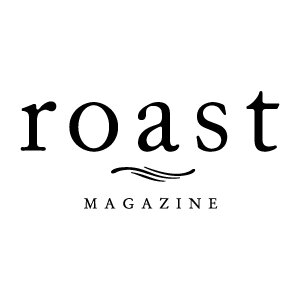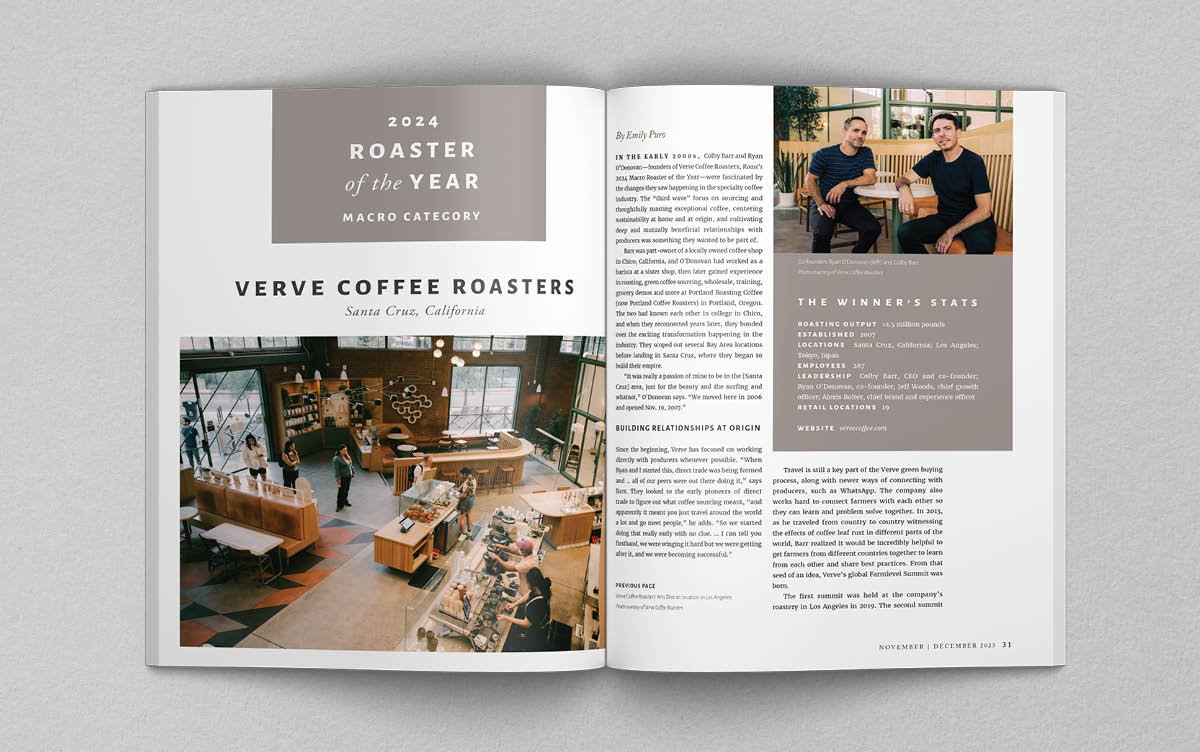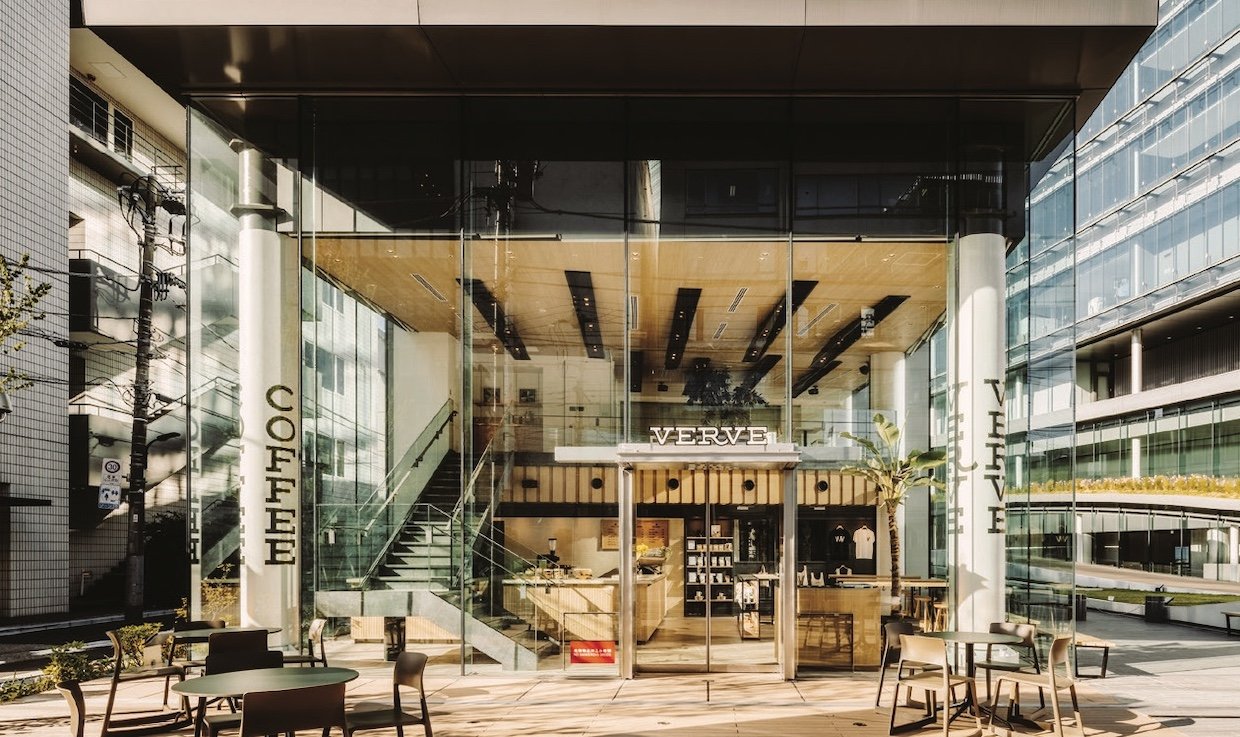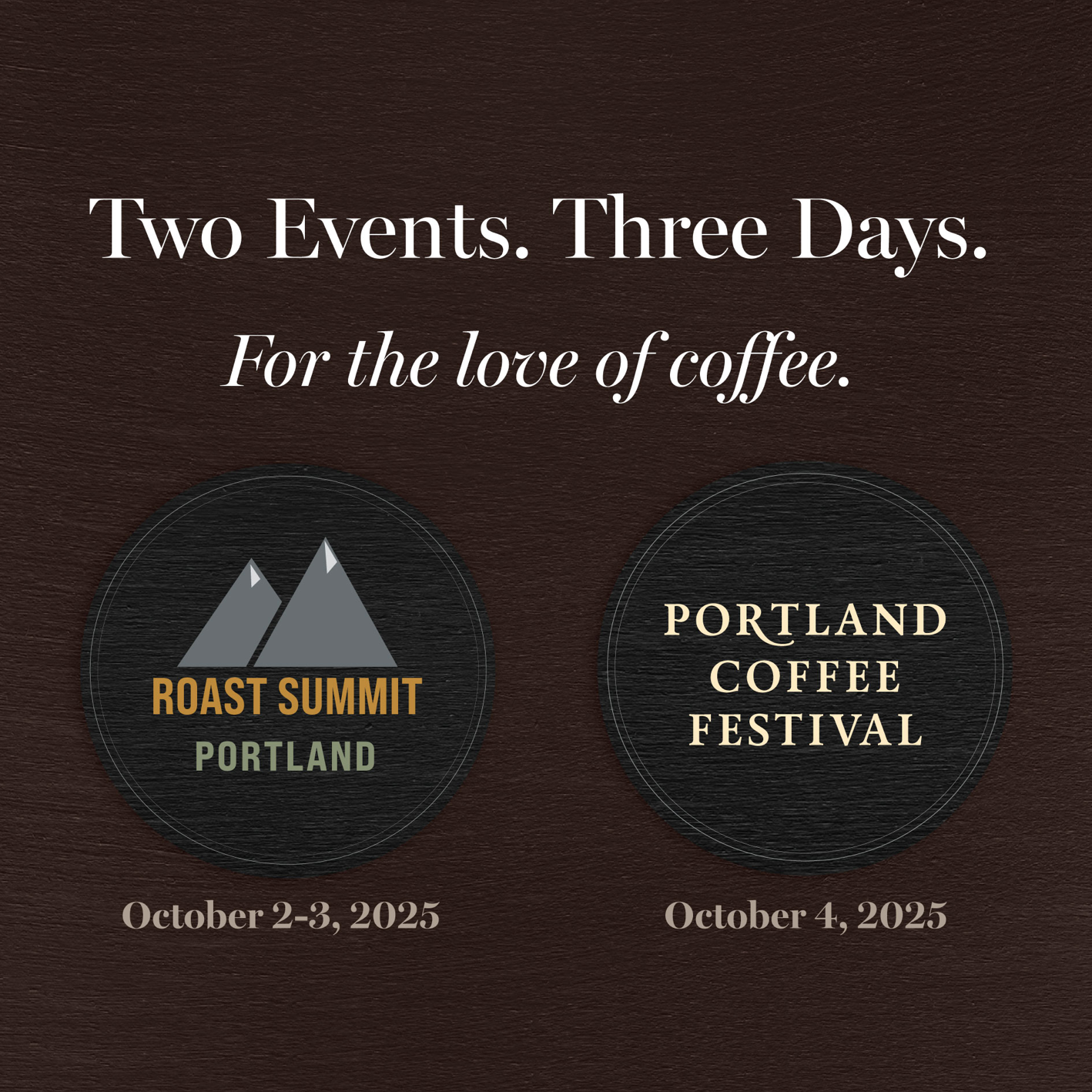Roaster of the Year: Macro Category Winner 2024—Verve Coffee Roasters
By Emily Puro
In the early 2000s , Colby Barr and Ryan O’Donovan—founders of Verve Coffee Roasters, Roast’s 2024 Macro Roaster of the Year—were fascinated by the changes they saw happening in the specialty coffee industry. The “third wave” focus on sourcing and thoughtfully roasting exceptional coffee, centering sustainability at home and at origin, and cultivating deep and mutually beneficial relationships with producers was something they wanted to be part of.
Barr was part-owner of a locally owned coffee shop in Chico, California, and O’Donovan had worked as a barista at a sister shop, then later gained experience in roasting, green coffee sourcing, wholesale, training, grocery demos and more at Portland Roasting Coffee (now Portland Coffee Roasters) in Portland, Oregon. The two had known each other in college in Chico, and when they reconnected years later, they bonded over the exciting transformation happening in the industry. They scoped out several Bay Area locations before landing in Santa Cruz, where they began to build their empire.
“It was really a passion of mine to be in the [Santa Cruz] area, just for the beauty and the surfing and whatnot,” O’Donovan says. “We moved here in 2006 and opened Nov. 19, 2007.”
Co-founders Ryan O’Donovan (left) and Colby Barr. Photo courtesy of Verve Coffee Roasters
Building Relationships at Origin
Since the beginning, Verve has focused on working directly with producers whenever possible. “When Ryan and I started this, direct trade was being formed and … all of our peers were out there doing it,” says Barr. They looked to the early pioneers of direct trade to figure out what coffee sourcing meant, “and apparently it meant you just travel around the world a lot and go meet people,” he adds. “So we started doing that really early with no clue. … I can tell you firsthand, we were winging it hard but we were getting after it, and we were becoming successful.”
Travel is still a key part of the Verve green buying process, along with newer ways of connecting with producers, such as WhatsApp. The company also works hard to connect farmers with each other so they can learn and problem solve together. In 2013, as he traveled from country to country witnessing the effects of coffee leaf rust in different parts of the world, Barr realized it would be incredibly helpful to get farmers from different countries together to learn from each other and share best practices. From that seed of an idea, Verve’s global Farmlevel Summit was born.
The first summit was held at the company’s roastery in Los Angeles in 2019. The second summit was held in 2022 after the peak of the covid-19 pandemic. Because the Verve sourcing model typically involves having a key partner in each country, usually a producer who also exports coffee—something of an ambassador, says Barr—the company brought its key partners from all over Latin America to Los Angeles to share their knowledge and experience. The team hopes to invite its partners from Africa to future summits as well.
Before each summit, Verve surveys its partners to ask what topics they’d most like to discuss, and to make sure they are all on board with sharing their experiences and knowledge with other producers. “The idea is that everyone is in different countries, so it’s kind of pre-competitive, and because we’re all part of the Verve thing, we have a lot of mutual respect,” Barr explains. Discussion topics have included everything from covid-19 to pricing, inflation, currency exchange, fertilizer techniques, labor issues, cultivars, processing techniques and beyond.
And the sharing doesn’t end when the summit ends. Verve created a WhatsApp group for participants of the first summit in 2019, which proved invaluable during covid-19 as producers could continue to connect with their peers around the globe to find out what was happening and how others were handling the unprecedented challenges the pandemic raised.
Verve’s two-story cafe in the entertainment district of Roppongi in Tokyo. Photo courtesy of Verve Coffee Roasters
Helping Producers Grow
Another major Verve initiative—The Nursery Project—came out of the desire to design a program that could drive meaningful change at origin, and that could be successful anywhere coffee is grown.
“When ideating on how Verve can help make an impact on the coffee industry as a whole, we thought to ourselves, ‘We need to set up a system that can work in any region, whether it’s Costa Rica, Colombia or anywhere else where coffee is a primary source of income,’” says Barr. “Our main goal was to do what we could without changing the farmer’s day-to-day approach to coffee growing, all while still addressing the many challenges—such as climate change, labor shortages and supply chain issues—they face regularly.”
Leveraging an existing relationship at origin, Verve rolled out its first Nursery Project in 2019. An exporting partner in Colombia had access to the land and labor required to set up and manage a coffee nursery, so Verve provided the funding to get the project off the ground. The result was 60,000 Caturra Chiroso seedlings distributed to 23 coffee producers in northern Colombia. (Caturra Chiroso is native to the area and is known for its high yield and cup scores.) The farmers received the seedlings at no cost, with the understanding that Verve would be given first opportunity to purchase any resulting yields.
“Many of the farmers who received seedlings actually used them to help their children develop their own farms,” Barr notes. “It was an unplanned but incredible twist to the program, and a way to create an opportunity for the next generation of coffee producers.”
The first harvest resulted in 1,775 pounds of green coffee. (One of those coffees was among the three samples the company sent to be judged as part of the Roaster of the Year competition.) Ten percent of sales from Nursery Project coffees support future nurseries. The goal was to create a new nursery in a different country every year, though covid-19 once again put those plans on hold. Verve plans to resume the project with a nursery in Honduras in the coming season.
To be clear, Barr is quick to point out that it’s not charity, and it’s not a guaranteed win for the farmers. “At the end of the day, this is farming and it’s tough,” he says. “For us, it’s all about partnerships. … We can extend this part, but you’re the farmer. You’ve got to go grow this. They know what it means to plant coffee.” About half of the Colombian growers who received seedlings from the project were able to successfully grow and harvest the coffee.
While Verve maintains close ties with its producer partners and has at times provided direct support for projects at origin, the main way the company supports farmers is by paying above market value for great coffee. Barr, who grew up in a farming family in northern California, says, “Ask any farmer on Earth what’s the one thing you can do to help them, and the answer every time is, ‘Pay me more.’”
To maximize its impact, Verve proudly partners with farmers doing innovative work on their farms and in their communities. Among those partners are Luis Pedro Zelaya, who has implemented regenerative farming practices on his farms in Guatemala; Arturo Paz, who added a water tank to collect water from a natural spring for his farm and, if needed, a nearby town; Valentina Duque, who works on sustainability projects across Colombia, including building parabolic dryers and sending young producers to earn Q certification from the Coffee Quality Institute; Ricardo Perez, who created the first carbon-neutral micro-mill in Costa Rica; and many more. And when the company’s longtime producer partner Amado Fernandez recently passed away, Verve honored his memory by helping to fund his lifelong dream to build a home for his family on their farm.
Verve’s roasters maintain the company’s exceptional quality and consistency through communication between facilities, and by using Cropster to track every roast. Photo courtesy of Verve Coffee Roasters
Innovations in Sustainability
Verve actively acknowledges that every aspect of its business has an impact on the environment, and the company makes a concerted effort to ensure that impact is positive. That focus informs processes and innovations in every department. For example, Verve intentionally located its Santa Cruz roastery within 75 miles of its annex and shipping port to reduce its carbon footprint, gaining further reductions by sending only full truckloads from the annex to the roastery. In 2020, Verve installed solar panels at its Santa Cruz headquarters and roasting facility, which has offset 424,000 pounds of carbon emissions, according to analytics provided by the vendor, Sandbar Solar.
The list goes on and on. In 2016, the company began a multi-phase installation of eco-friendly one-to-one reverse osmosis water filters at its Santa Cruz site, with the goal of ultimately installing them in all locations. And in 2023, Verve eliminated paper for all internal communications.
Recycling and composting are also among the company’s top priorities. Verve has updated its ready-to-drink (RTD) packaging and shipping materials to make sure they are reusable, compostable, or at the very least curbside recyclable. It also developed a new curbside recyclable RTD can with no plastic sleeve, which will launch in 2024. The company composts more than 200 pounds of chaff per week, donating more than half to the community for mulch and fertilizer, and it recycles burlap bags and reuses plastic bags from green coffee samples. In addition, Verve uses compostable service ware in its Santa Cruz cafes, where it’s required by local ordinance, and is working to expand the program to all of its retail locations. The company also makes sure its supply and merchandise vendors have transparent sourcing practices
Perhaps even more important than composting and recycling, however, is waste reduction. Verve reduced its RTD product loss by 65 percent over the past three years by implementing a number of innovations, and it uses a non-consumable formula engineered to closely replicate the texture of milk for barista training. In addition, baristas receive training on inventory management and waste reduction for milk dosing.
Clearly, every effort is made to optimize sustainability through small steps and giant leaps, and Verve maintains its focus on continuous improvement. It’s currently part of a pilot program with Gaeastar to introduce the San Francisco-based company’s 3D-printed compostable clay cups into its shops. “It’s a zero-waste cup,” says Katie Kelso, head of marketing and PR for Verve. “It comes from the Earth and can go back to the Earth, completely compostable.”
Gaeastar is still fine-tuning the program, but the goal is to test the cups in some of Verve’s cafes soon, and eventually to have 3D printers in all of its cafes for on-demand printing. The company likely will have collection boxes in its cafes, but collecting the material isn’t necessary, says Kelso. “It doesn’t require the usual oxygenation and churning because it’s made of clay from the Earth,” she explains. “You can literally just throw it in your garden.”
Jessica Groza and Lyndia McGauhey at Verve’s University Ave. cafe in Palo Alto, California. Photo courtesy of Verve Coffee Roasters
The Team is the Culture
As Verve has grown, the leadership team has kept a steady eye on maintaining the brand’s culture and identity, which means training staff on what makes Verve special, and providing benefits to ensure staff feel valued and engaged.
“The team is everything and the team is the culture,” says Barr, “so we’ve always put a ton of energy into hiring and new hire orientation and education. … The point is getting great people on the team and then trying to really communicate why we’re here and what we’re all doing.” The company has a dedicated training team that oversees all corporate, cafe and wholesale training programs, including new hire orientation, coffee education, harassment prevention, compliance, and management and leadership training—including a manager-in-training program to promote internal growth. Baristas complete technical training in extraction, brewing fundamentals, latte art, espresso, and equipment maintenance. The production and RTD teams complete safety trainings and refreshers regularly, and Verve recently launched a new production setup and related trainings to improve employee ergonomics.
“The idea at a high level is, we want to bring the right people on and have them be excited to be part of Verve,” says Barr, “give them the tools they need to really be successful and confident, and then create a lot of micro-opportunities along the way for additional education and professional development.”
The company offers a comprehensive array of employee benefits as well, including health care, vision and dental coverage; paid time off for full-time staff; competitive living wages; free coffee and discounts; an employee engagement fund for monthly team activities; and more. In addition, all employees are welcome to participate in every cupping and coffee-related class the company offers.
“The team is everything, and the team is the culture,” says Verve co-founder Colby Barr. Pictured: Jenifer Simental (left), Jade Stephens and Becca Joy (middle), Austin Castro (right). Photos courtesy of Verve Coffee Roasters
A Mindful Approach to Growth
Currently, Verve has roasteries in Santa Cruz, Southern California and Japan, with retail shops in Santa Cruz, Los Angeles, the San Francisco Bay Area—including some high-profile Silicon Valley tech campuses, such as Meta, the parent company of Facebook and Instagram—and Japan. But at every stage, it was relationships that guided expansion.
After gaining traction in Santa Cruz, says Barr, the next logical step would have been to open a location “over the hill” in San Jose or Los Gatos, California. Instead, after developing a successful relationship with a restaurant group that supplies some of the top restaurants in Los Angeles, the team decided to take its first steps toward expansion there. “Los Angeles is actually one of the most interesting cities in America,” says Barr. “It’s super complex and quilted. They say it’s a city of 1,000 villages, and it’s true.”
Through its partnerships with those top Los Angeles restaurants, Verve gained the attention of Japanese developers looking for a West Coast coffee roaster to anchor the newly redesigned Shinjuku Station in Tokyo, which holds the Guinness World Record for being the busiest train station on the planet. The developers brought the Verve team to Japan to see the site, and they fell in love with Tokyo.
“It would have made more sense for us to go east, like to New York,” says Barr, “but instead we went further west. We were kind of joking, you know, keep going west, and we ended up in Japan and it’s amazing.”
The company has grown its product lines over the years as well. In addition to whole-bean coffee, Verve offers craft instant and an extensive RTD line of a flash-brewed canned coffee drinks (brewed hot to extract the same flavors as a pour-over, then canned and intended to be served cold). Verve’s RTD oat milk lattes feature house-made oat milk and come in original, mocha and honey lavender. The company is set to launch a new formulation of the lattes in 2024 without any gums, oils or refined sugars.
“We have some other product lines we’re going to be launching soon,” says Barr, “but I don’t know that we’re ready to talk about them yet, and a couple other product innovations we’re working on that will be launching in the next year.”
As the company grows, it continues to refine its roasting processes to maintain product quality and consistency. “We have our roastery here in Santa Cruz and we also have our roastery in Japan,” says Matt Tilley, head of coffee, “and as we’re expanding, we’ve started to do some roasting down in Oxnard [California] as well. So as our team’s getting bigger and our locations are expanding, we’re looking at more ways to sustain that growth.” That’s mainly achieved through ongoing communication between sites, and the fact that they all roast on the same model Loring roasters and track every roast in Cropster.
“Everything that we roast that has our name on it, we make sure that it’s tracking on all our graphs that are centralized in Cropster,” Tilley explains. “We make sure that everything is in alignment from the original profile that we set at HQ, and that the weight loss is recorded, the color scores are tracked, our in-between batch protocols are being met, so there’s just a real clean uniformity across all locations. Expansion is super exciting, and it’s something we all want, but we obviously don’t want to lose the essence and the reason we were able to expand, which is our quality, so we really make sure that’s at the forefront.”
The next step in Verve’s expansion will be a larger Safe Quality Food (SQF)-certified roasting facility on the East Coast. “Our Oxnard facility was necessary for some of the SQF customer requests we’ve been getting as we grow,” says Jeff Woods, chief growth officer for Verve. “We realize that is going to be a key component for a lot of the people we’re working with, and a lot of our growth is on the East Coast, so we have been looking for another, larger SQF facility out there.” That facility is slated to be online within the next 18 months or so, and is driving the development of more formalized processes and procedures for the roasting team. “As we look at expanding out that way,” Woods says, “we’ve had to set up new standard operating procedures and protocols internally on the West Coast to be able to start mirroring that and preparing for that as we move to that East Coast expansion.”
Verve’s leadership team is proud of all the company has achieved, from expanding its roasting and retail operations nationally and internationally to developing new and innovative lines of instant and RTD coffees. It’s also proud of the support it’s been able to provide to growers and employees, and the relationships it’s built with wholesale and retail partners. “We’re on a ramp-up with Whole Foods, which we feel is perfect brand alignment for us,” says Barr, “and we’re nationwide with REI with our instant, which we feel is amazing.”
But even with its dynamic growth model and global success, Verve maintains its focus on the company’s core values. “Growth and making a real impact take time, so we’ve always been more focused on a slow, steady and thoughtful approach,” Barr says. “At the end of the day, our goal is to make great coffee approachable for everyone, and to make sure that as a community, from our farmers to our shops, we have a system in place that can sustain our mission.”
* * *
Emily Puro is a freelance writer and editor living in Portland, Oregon. In addition to Roast, her articles and essays have appeared in Writer’s Digest, Better Homes and Gardens, Portland Monthly, The Oregonian and numerous other publications. She enjoys learning about the art and science of coffee, as well as the social and environmental impacts of the industry, and she continues to be amazed by those devoting their lives to this work.
Advertisement















